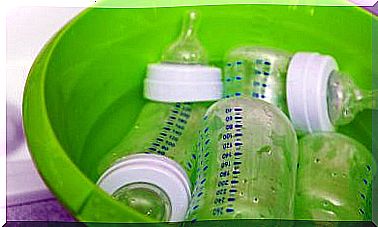Children Who Have Problems With Self-regulation

Have you ever noticed that your child reacts impulsively in emotional situations? Does your child have difficulty falling under certain circumstances? It can happen to children who have problems with self-regulation. Next, we will look at what to do when a child has this kind of problem.
Many situations require the ability to regulate oneself. Children need to have skills in self-regulation in their daily lives.
Often, children with ADHD (attention deficit hyperactivity disorder) or those with sensory processing problems lack this ability. This means that they sometimes do not know how to regulate themselves in emotionally charged situations.
Children who have problems with self-regulation: What does it mean?
While it is easy to confuse self-control and self-regulation, there are two different things that are related.

- Self control. It is a social skill that helps children control their behaviors, impulses and emotions.
- Self-regulation. It is also a skill, but it is about dealing with emotions, behaviors and body movements when faced with a complicated or difficult situation. It can make children pay attention and focus on the situation.
Self-regulation helps children know how to fall down when upset, and prevent outbursts of frustration. For example, it is normal for a four-year-old to have tantrums because he or she has not yet learned to regulate himself or herself. However, if it is a twelve-year-old who does, it means that he or she has problems regulating himself or herself.
How does self-regulation work?
To understand what self-regulation is, you can think about the function of a thermostat. What does a thermostat do? The mechanism is to adjust and maintain the temperature in a room. When the room reaches a certain temperature, it will turn off and then on again when the room temperature drops below this. You set a point where the heat will go out.
Self-regulation is a similar process. Children also have a “point” where they have the ability to control their emotions and behavior appropriately.
However, in order to maintain control, they need to know what their point is so that, in any given situation, they can assess how they are feeling and react so that they do not exceed that point. This process works with how they process information and emotions and knowledge of what to do with them.
Problems with self-regulation and ADHD
It is often difficult for children with ADHD to control their emotions. That is why they react out of proportion. You should also keep in mind that children with this problem also lack adequate impulse control. Therefore, they may react inappropriately according to the situation they are in.
It is because of all this that children sometimes react in an excessive way because they are unable to stop and think about the situation or look for solutions.
Problems with self-regulation and sensory processing difficulties
Children with sensory processing difficulties have difficulty using sensory information, such as the information they receive from touch, sight, hearing, smell, taste, and others, such as perception, the proprioceptive sense, and the vestibular sense.
The origin of the problem is found in the nervous system, which has problems regulating itself. For that reason, if children are in a situation where there are many sensory concerns, they are not able to regulate themselves. This leads to uncontrollable emotions and behaviors.
How can we help children who have problems with self-regulation?
There are ways to help children who have problems with self-regulation – but how? The first thing to do is to know when the way you perceive information is a problem – either through the senses or through the mind.

What steps require self-regulation?
- Self-awareness. Whether the problems with self-regulation come from the child having problems with ADHD or sensory processing difficulties, you need to help the child see which situations are causing emotional stress. For example, you can let the child know in advance if you are going to attend an event that will cause the child to have a bad reaction. It can help the child prepare himself.
- Impulse control. Children with ADHD, regardless of whether they know there are solutions to certain problems, cannot avoid the impulse to become angry or frustrated. As a result, parents play an important role in helping them deal with their emotions and reactions more appropriately. Also to teach them skills to overcome these problems.
- Set goals. You need to work on setting realistic, small goals so that the child, little by little, is able to achieve bigger goals.
Help children who have problems with self-regulation
As you have seen, some children have problems with self-regulation. It is important that you know how your children should develop according to their age. In addition to everything else, parents can also talk to their children to explain what their “point” is and where they are.
However, you should always show your children ways in which they can deal with frustration and anger. In addition, children with this problem can also use an activity sheet for self-regulation.









